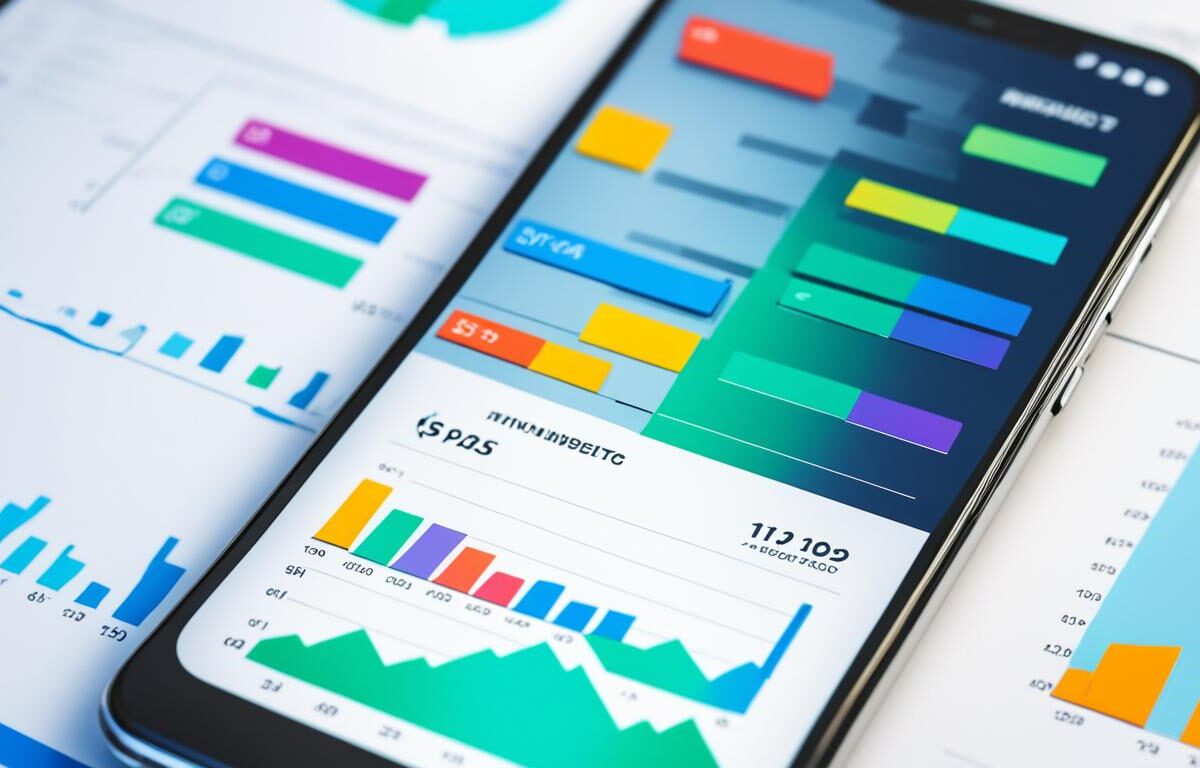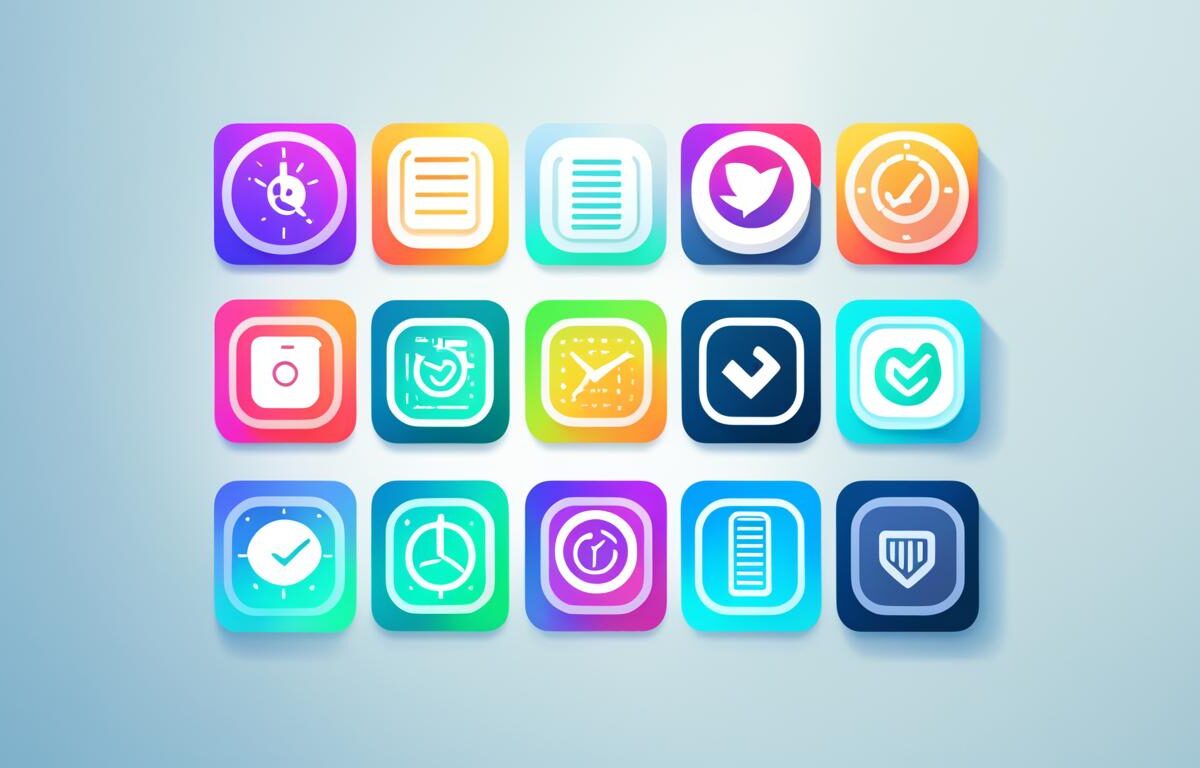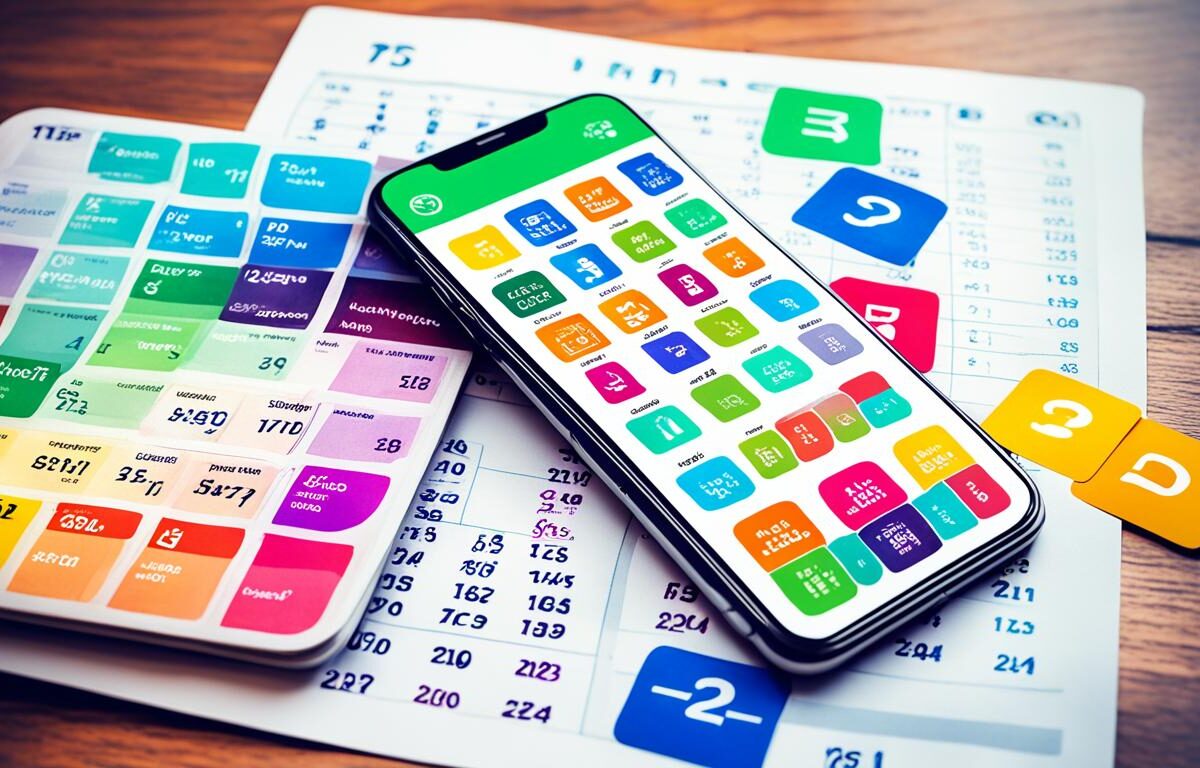I struggled with eating healthy for a long time. But then, I found nutrition trackers. They changed everything for me. Now, I use them every day to help me make better food choices.
These apps are like my personal health coaches. They help me understand what I eat and how it affects my health. By tracking my food, I’ve learned to eat better and feel better too.
Are you trying to lose weight, manage a health condition, or just eat healthier? Nutrition trackers can really help. They let you see what you eat every day. This helps you understand your eating habits and how to improve them.
Tracking your meals makes you more aware of what you eat. It helps you make choices that are better for your body. It’s a way to connect with your body and take care of it.
In this guide, we’ll see how nutrition trackers can make you healthier. We’ll talk about managing portion sizes and getting the right nutrients. These tools are changing how we eat and take care of ourselves. Let’s learn how to use them to improve our lives.
The Importance of Tracking Your Daily Food Intake
Tracking your daily food intake is key to a healthier diet and lifestyle. Food tracking, or calorie counting, boosts your diet awareness. It helps you connect better with what you eat. This awareness leads to smarter diet choices.
Awareness and Mindful Eating
By tracking your food, you pay more attention to your eating habits and what you eat. This mindful eating helps you spot areas to improve. You can then change your diet for the better.
Portion Control
Food tracking also helps you see your portion sizes clearly. Over time, you learn what a balanced meal looks like. This knowledge is crucial for keeping healthy portion sizes and reaching your diet goals.
“88% of people who track their intake on applications such as MyFitnessPal for just 7 days lose weight.”
Studies prove that regular food tracking aids in weight management and health. Logging your daily food helps you see patterns and areas for better choices. This supports your nutrition and fitness goals.
Nutrition Trackers: A Comprehensive Tool for Balanced Nutrition
Nutrition tracking is more than just counting calories. It helps you focus on the nutritional balance and quality of your meals. This tool gives you a clear view of your daily intake. It lets you set realistic weight loss and health goals. This can be a big help in reaching your fitness goals.
Nutrient Balance and Quality
Tracking your food intake shows where you might be missing out on vitamins and minerals. This lets you adjust your diet for better nutritional balance. Being aware of this can improve your health overall.
Weight Management and Goal Setting
Nutrition trackers are key in weight management. They give you a detailed look at your caloric intake. This helps you set and track weight loss goals. Using data to guide you can be very effective in meeting your health and fitness goals.
Over 200 million people use the app to reach their health and fitness goals. It helps nearly 1 million members each year with their nutrition and fitness goals.
![]()
“Excess of everything is terrible, and the body suffers when we eat food without knowing its nutritional content. This ignorance is one of the primary reasons for obesity, which is a severe health problem prevalent nationwide.”
By using nutrition tracking, people can be more proactive about their health. They can ensure a balanced diet and effective weight management.
Identifying Unhealthy Patterns and Triggers
Recording what you eat can help you spot unhealthy eating patterns and find out why you eat them. By keeping track of your food, you’ll learn a lot about yourself. This is key to breaking bad habits and finding better ways to deal with stress or emotions.
Studies show that tracking your food helps you lose weight and keep it off. It makes you more aware of what you eat. This leads to better choices and eating habits. Looking back at your food journal can show you what triggers your eating habits. This helps you make plans to change for the better.
Using a mobile app or a notebook to track your meals can change your life. It helps you see why you eat certain foods. This way, you can find healthy ways to deal with stress or other things that affect your eating. Tracking your food can lead to a better understanding of your eating habits and improve your health.
“Tracking your food intake can be a game-changer in identifying the underlying triggers for unhealthy eating patterns. By gaining self-awareness, you empower yourself to break negative cycles and cultivate more positive habits.”
| Key Benefits of Nutrition Tracking | Strategies for Healthier Eating |
|---|---|
|
|
Using nutrition tracking can start a big change in your eating habits and health. It helps you see what affects your eating and how to change for the better. You can make lasting behavior changes that fit your health goals.
Accountability and Motivation: Keys to Sustainable Change
Making lasting changes in your nutrition and health needs accountability and motivation. Using a nutrition tracking app helps you keep track of your food. This makes you feel committed to your health goals.
Meeting regularly with an online coach or nutritionist helps keep you on track. Studies show that having someone to hold you accountable boosts your chances of reaching your health goals.
Looking back at your behavior change and progress can motivate you. Seeing how your efforts have made a difference can make you want to keep going. Tools like fitness trackers help you stay active and connected to your goals.
“Personalized, evidence-based plans are recommended to keep individuals accountable and motivated toward their goals.”
Accountability and motivation are key to lasting changes in your nutrition and health. With nutrition tracking, you can start a healthier, more fulfilling life.
![]()
Nutrition Trackers for Improved Digestion and Energy Levels
Keeping your gut healthy and your energy up is key to feeling good. Nutrition apps help you see how food affects your mood and health. They guide you to eat better for your digestion and energy.
Cronometer is a top app for this. It shows your calories, nutrients, and vitamins. It helps you find out if you’re missing any nutrients that could make you feel tired or have stomach issues.
| Nutrition Tracker | Key Features | Pricing |
|---|---|---|
| Cronometer | – In-depth nutrient analysis – Personalized macro and micronutrient goals – Integrates with fitness devices |
$9.99/month for Cronometer Gold |
| Levels | – Continuous glucose monitoring – Personalized nutrition recommendations – Macro and micronutrient tracking |
Levels membership starts at $199/month |
| mySymptoms Food Diary | – Tracks food-related symptoms – Identifies trigger foods – Supports gut health |
$4.99/month or $49.99/year |
mySymptoms Food Diary is another great app. It lets you log your food and track symptoms like gas or bloating. This way, you can find out what foods upset your stomach and avoid them.
Using a good nutrition tracker can really change how you feel. It helps you see what foods are good or bad for you. By making smart food choices, you can boost your digestion and energy levels all day.
The Best Nutrition Trackers on the Market
Finding the right nutrition tracking app can really help you reach your health goals. Noom and Cronometer are two top choices. They offer great features for tracking food and guiding you towards better health.
Noom: Best for Weight Loss
Noom is a top weight loss app. It uses a “stoplight” system to label foods as green, yellow, or red. This helps you make smarter food choices. Plus, it gives you personalized nutrition plans and expert advice to help you manage your weight.
Cronometer: Best for Food Tracking
Cronometer is great for detailed food tracking. It has a huge database and lets you scan barcodes. This app helps you keep track of what you eat and reach your diet goals. It’s perfect for anyone looking to lose weight, gain muscle, or just eat better.
Noom and Cronometer are highly rated by users. Noom has a 4.7-star rating on the App Store and 4.6 on Google Play. Cronometer scores a 4.8 on the App Store and 4.6 on Google Play. These nutrition tracker apps are made to help you make better food choices and achieve your fitness goals.
![]()
“Noom and Cronometer have changed how I see nutrition and health. Their detailed tracking and personalized advice have really helped me meet my health goals.”
– *Emily, a Noom and Cronometer user*
How to Get Started with a Nutrition Tracker
Starting with a nutrition tracker can change the game for your health and wellness goals. It’s great for losing weight, improving digestion, or keeping a balanced diet. These tools offer the guidance and accountability you need to make lasting habits. Let’s look at how to start right.
Setting Realistic Goals
The first step is to set realistic goals. Think about what you want to achieve, like eating less sodium, more protein, or reaching a weight goal. Write these goals down and keep them in sight. This will remind you why you’re on this journey. Tracking your progress will keep you motivated and focused.
Consistency is Key
Being consistent is crucial for nutrition tracking. To get the best results, make logging your meals and snacks a daily habit. Just a few minutes each day can give you valuable insights into your eating habits. This helps you see where you can improve. Stick with it, and soon, logging your food will become easy.
Starting with nutrition tracking is just the beginning to a healthier life. By setting achievable goals and logging consistently, you’re on your way to better habits. These habits will change how you see food and boost your overall health.
“Consistency is the key to unlocking the full benefits of a nutrition tracker. To see the best results, you need to make logging your meals and snacks a daily habit.”
Overcoming Challenges with Nutrition Tracking
Nutrition tracking can greatly improve your eating habits and help you reach your health goals. But, it comes with its own set of challenges. It might feel overwhelming or require too much detail. The key is to be patient, keep going, and make small, lasting changes over time.
One big challenge is focusing too much on numbers like calories or macronutrients. Studies show that negative feelings like anxiety and stress can make you eat more. If keeping a food journal makes you feel bad or doesn’t help, try mindful eating instead.
Another hurdle is staying consistent over time. A review of 15 studies found that keeping a food diary can lead to significant weight loss. But, it’s important to keep going, even when you’re busy. Set achievable goals and celebrate your successes along the way.
Perseverance is crucial with nutrition tracking. 68% of people reported eating more mindfully when tracking their food with an app or journal. By facing challenges and focusing on progress, not perfection, you can fully benefit from tracking your nutrition and reach your health goals.
![]()
“If keeping a food journal is triggering or unhelpful for an individual, alternative strategies like mindful eating may be more suitable.”
Troubleshooting Common Obstacles
- Avoid getting fixated on numbers; use data to improve overall diet quality.
- Experiment with different tracking methods to find what works best for you.
- Celebrate small victories and stay consistent, even when life gets busy.
- Consider seeking support from a registered dietitian or health coach, if needed.
The Power of Perseverance
- 75% of clients found food tracking to be a valuable tool in ensuring they were consuming enough nutrients, especially protein and fiber, to support their health goals.
- 83% of individuals with a history of dieting found food tracking to be instrumental in helping them overcome food fears and improve their relationship with food.
- 91% of clients indicated that food tracking helped them troubleshoot specific obstacles such as digestive distress, sleep disturbances, or poor recovery from exercise.
By facing challenges and focusing on progress, not perfection, you can fully benefit from nutrition tracking and achieve your health goals.
The Future of Nutrition Trackers and Digital Health
The digital world is always changing, and so is the future of nutrition trackers and digital health. Thanks to fast technology growth, we’ll see new features that change how we think about our health and eating habits.
One big change is more focus on personalized healthcare. Nutrition trackers will get even better, using smart algorithms and learning from our data. They’ll give us advice that fits our own health needs and goals. This will help us make better choices about what we eat and do for our health.
We also expect nutrition trackers to work better with other health devices, like fitness trackers and smart home gadgets. This will let us see our health in a bigger picture. We can track our eating, exercise, sleep, and overall health together.
AI and machine learning are also coming to nutrition tech. These technologies will make nutrition trackers more accurate and smart. They’ll give us advice that’s really right for us, helping us stay healthy and well.
The market for nutrition apps is getting bigger, expected to hit USD 14.0 billion by 2033. With new features, better personal advice, and more connections with health tech, we’re entering a new era. This will change how we handle our health and wellness, letting us take charge of our well-being like never before.
“The future of nutrition trackers and digital health is about empowering individuals to make more informed and personalized choices for their well-being.”
Conclusion
In today’s wellness world, knowing what you eat is key. It’s not about cutting things out, but about making smart choices. Tracking your food helps you manage your weight, understand your eating habits, and eat more mindfully.
Start this journey of self-discovery and see how your choices can lead to a healthier life. With nutrition trackers, you can learn about your eating habits, find ways to improve, and reach your healthy eating goals. Tracking your food is the first step to a balanced and fulfilling life.
Remember, improving your nutrition isn’t always easy, but it’s worth it. Celebrate your wins, learn from your mistakes, and keep going. With time, you’ll get stronger, more resilient, and better connected to your body’s needs. Let nutrition tracking change your life for the better.






